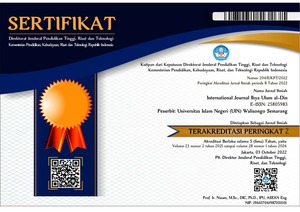Nationalism, Patriotism and Political Ideas of Sir Syed Ahmad Khan: an Analysis
DOI:
https://doi.org/10.21580/ihya.23.2.9263Keywords:
Sir Syed, Nationalism, Political Ideas, Community Harmony.Abstract
Sir Syed Ahmad Khan (Founder of Aligarh Muslim University) was born into a noble Muslim family in 1817; he was a distinguished scholar while working as a lawyer at the British East India Company. After realizing the worthless condition of Muslims, his approach to western education for the benefit of the Muslim community became a priority. This study contemplates that Sir Syed was religiously oriented and very politically aware of nationalism and patriotism. The author uses primary data and also secondary data. The author also explores his main books and articles; the author aims to examine Sir Syed's nationalist and political ideas concerning political significance for Muslims in India. The writer would like to know the result that, what is the reason, Sir Syed was against the Indian National Congress. At the same time, the whole Indian society was afraid of the British, but Sir Syed maintained his good relations with the British, and he also showed the loyalty of the Muslims towards them. This study found the conclusion about Sir Syed that he became a symbol of communal harmony.
Downloads
References
Amir, Safia. 2000. Muslim Nationhood in India. New Delhi: Kanishka Publisher.
AMU, Nigeria. 1998. The Glowing Legend of Sir Syed. Aligarh: Aligarh Muslim University.
Ansari, Iqbal. A. 1989. The Muslim Situation in India. New Delhi: Sterling Publisher private Limited.
Hasan, Muhammad. 1997. Legacy of a Divided Nation. Delhi: Oxford University Press.
Ansari, Iqbal. 1989. The Muslim Situation in India. Sterling Publisher Private Limited, 61.
Jain, N. K. 1983. Muslim in India: A biographical dictionary. Manohar Publication, II.
Jiang, D. Lan. 2016. The Evolution of Sir Syed Ahmad Khan's Political Identity. Cross-Cultural Communication, 6.
Khan, Sir Syed. 2004. Muslims In India. Aligarh: Aligarh Mulsim University.
Khan, Sir Syed. 2004. Selected Essay of Sir Syed Ahmad. Aligarh: Aligarh Muslim University.
Jiang, D. Lan. 2016. The Evolution of Sir Syed Ahmad Khan's Political Identity. Cross-Cultural Communication, 12, 7.
Muhammad, Syed. 1969. Sir Syed Ahmad Khan A political biography. Meerut: Minakshi Prakashan.
Nizami, Khaliq Ahmad. 1985. Sir Syed Album. Delhi: Jayyed Press.
Panipati, Muhammad Ismail. 1963. Maqala-e- Sir Syed. Syed Imtiyaz Ali Taj, 41.
Panipati, Muhammad Ismail. 1979. Safaranama Punjab. Educational House, 200.
Panipati, Muhammad Ismail.-e.-S. 1990. Maqalat-e-Sir Syed. Majlis-e-Taraqqi Adab, V, 36.
Prasad, Rajendra. 2010. India Divided. New Delhi: Penguin Books.
Raza, Muhammad. 2001. Sir Syed A True Nationalist. Sir Syed Ahmad Khan; A centenary tribute.
Sherwani, Haroon Khan. 1944. The Political Thought Of Sir Syed Ahmad Khan. The Indian Journal of Political Science, 310.
Meerut, Sir Sayyid. n.d. Retrieved August 31, 2017, from http://www.columbia.edu/itc/mealac/pritchett/00islamlinks/txt_sir_sayyid_meerut_1888.html.
Khan, Sir Syed Ahmad.n.d. Retrieved October 17, 2017, from Aligarh Muslim University: https://indianexpress.com/ article/opinion/columns/misreading-sir-syed-ahmad-khan aligarh-muslim-university-489379.
Downloads
Published
How to Cite
Issue
Section
License
By submitting an article to the journal, the author(s) agree to transfer the published article's copyright to the journal, which will act as the publisher. This means the journal will have the right to publish the article in various forms, including reprints. The journal will maintain the publishing rights to the published articles.
This work is licensed under Creative Commons Attribution-ShareAlike 4.0 International License.
In line with the license, authors and third parties (readers, researchers, and others) are allowed to share and adapt the material. In addition, the material must be given appropriate credit, provided with a link to the license, and indicated if changes were made. If authors remix, transform or build upon the material, authors must distribute their contributions under the same license as the original.



